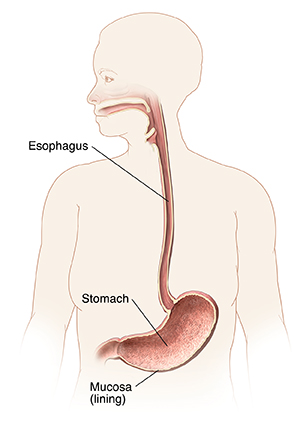A
B
C
D
E
F
G
H
I
J
K
L
M
N
O
P
Q
R
S
T
U
V
W
X
Y
Z
Click a letter to see a list of conditions beginning with that letter.
Click 'Topic Index' to return to the index for the current topic.
Click 'Library Index' to return to the listing of all topics.
What Is Stomach (Gastric) Cancer?
Cancer starts when cells in the body change (mutate) and grow out of control. These cells can form lumps called tumors. Cancer that starts in the cells of the stomach is called stomach or gastric cancer.
Understanding the stomach
The stomach is the sac that holds and helps digest food. The wall of the stomach is made of many layers of tissue.
When food is swallowed, it goes down a tube called the esophagus. The esophagus carries it to the stomach. The stomach adds chemicals and fluids to food that help start the process of digestion. There's a strong muscle layer of the stomach wall. It squeezes and mixes the contents to make it soft. Food then leaves the stomach and goes into the small intestine.

When stomach cancer forms
Stomach cancer almost always starts in the stomach’s innermost layer or lining, called the mucosa. This type of stomach cancer is called adenocarcinoma.
Cancer cells can then spread deeper into the other four layers of the stomach. If cancer cells reach the stomach’s outer layer, they can spread into nearby organs.
Stomach cancer can also spread to other parts of the body. This spread is called metastasis. The more cancer spreads, the harder it is to treat.
Treatment choices for stomach cancer
Treatment depends on several things. They include the type and stage of stomach cancer, possible side effects, your overall health, and your preferences. You and your healthcare provider will decide on the treatment plan that’s best for you. It's common to get more than one type of treatment. Your treatment choices may include:
-
Surgery to remove the tumor or the part of the stomach with cancer along with some nearby tissue. Sometimes the whole stomach must be removed (called gastrectomy).
-
Chemotherapy (chemo) uses strong medicines that kill cancer cells. Many times, a combination of medicines is used. Chemo is often given before and after surgery. It can also be given along with radiation. If chemo is given before surgery, it is called neoadjuvant chemotherapy. If given after surgery, it is called adjuvant chemotherapy. When chemotherapy is combined with radiation therapy, it is called chemoradiation.
-
Targeted therapy uses medicines that focus on specific features or changes in the cancer cells. This helps save normal cells while targeting and killing cancer cells. It may be used for advanced stomach cancer.
-
Immunotherapy may also be used for advanced stomach cancers alone or with other treatments. These medicines boost the natural immune system so it can better find and kill cancer cells.
-
Radiation therapy uses focused beams of energy from X-rays or other radiation sources, to kill cancer cells. It may be used before or after surgery.
-
Clinical trials is medical research used to test new ways to treat cancer. Ask your healthcare provider if there are clinical trials you should consider as a treatment choice.
Online Medical Reviewer:
Jessica Gotwals RN BSN MPH
Online Medical Reviewer:
Susan K. Dempsey-Walls RN
Online Medical Reviewer:
Todd Gersten MD
Date Last Reviewed:
7/1/2023
© 2000-2025 The StayWell Company, LLC. All rights reserved. This information is not intended as a substitute for professional medical care. Always follow your healthcare professional's instructions.